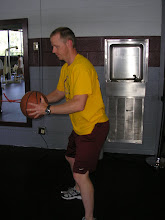At work I posed the question about the definition of athleticism. My point was to show that we inadvertently see primarily athletes as athletic but we have to consider that all people have a certain degree of athleticism just to live life. this idea I heard of first from Gary Gray a physical therapist from Adrian Michigan. He poses the idea that even the "little old lady" walking down the street is an athlete. She too must demonstrate a certain level of skill just to get groceries or to walk. However in my attempt to discuss the via email with my co workers the default is back to athletes only. You con't have to be in a competitive arena to display athleticism.
What are your thoughts?
Tuesday, January 20, 2009
Subscribe to:
Post Comments (Atom)

1 comment:
So what is the definition of athleticism. No one seemed to actually look the word up. In couple of reference dictionaries, I found the following definitions of athleticism: n. an athletic quality; n. The practice of engaging in athletic games. Now these seem to be different in and of themselves. But both pertain to "athletic". Athletic deriving from athlete. Two definitions of athlete include: 1. n. a person trained in exercises, games, or contests requiring physical strength, skill, stamina, speed, etc; 2. n. A person possessing the natural or acquired traits, such as strength, agility, and endurance, that are necessary for physical exercise or sports, especially those performed in competitive contexts. From these accepted definitions, you can see how anyone who displays "strength, agility, endurance, stamina" or "who participates in physical activity, exercise or sports" could be consider an athlete. Likewise, anyone may be considered athletic or to possess some degree of athleticism (considering the flexibility of their definitions) yet not be considered athletes.
I agree that you do not have to be in a competitive arena to display athleticism, but my question is why do we have to consider that all people have certain degree of athleticism? If everyone one does, therefore making it a normal aspect of human life/existence, then why do we need the word in the first place? Why do we have a word to describe words that we have already created and defined, such as strength, endurance, stamina, agility, coordination, etc.? Let's go back to root of the words athleticism, athletic, athlete, etc: [latin athleta < Gr athletes, contestant in the games < athlein, to contest for a prize < athlos, a contest, athlon, a prize, from āthlein, to contend, possibly from āthlos, contest.] So, why the creation of these words. It seems to me, like other similar words, they are created for a specific reason or in this case specific reference for particular individuals of certain traits/qualities. I would argue this is not to segregate athletes from non-athletes, but rather to provide us with a way to communicate efficiently. When we try to extend the definition of words beyond their intended purpose, what are we really accomplishing? Take Gary Gray's idea that everyone is an athlete. Although, this sounds like a good idea, is it true, correct, or appropriate? I don't know. But again, if everyone is an athlete, then all humans are athletes, therefore there is no distinction and therefore no need for the word athlete? That does not seem to make sense. Then do we train everyone like an athlete? It seems to me that considering everyone to be an athlete, everyone to have athleticism, or to train everyone like an athlete is merely just a ideological approach, which if it works, awesome! But again, does that make it correct, right or appropriate? There is science behind language and words (lingusitics, semantics, grammar, morphology, syntax, phonology, etc). Leading to my last question, where is the science behind everyone is an athlete, everyone has athleticism or everyone should be trained as an athlete?
Post a Comment